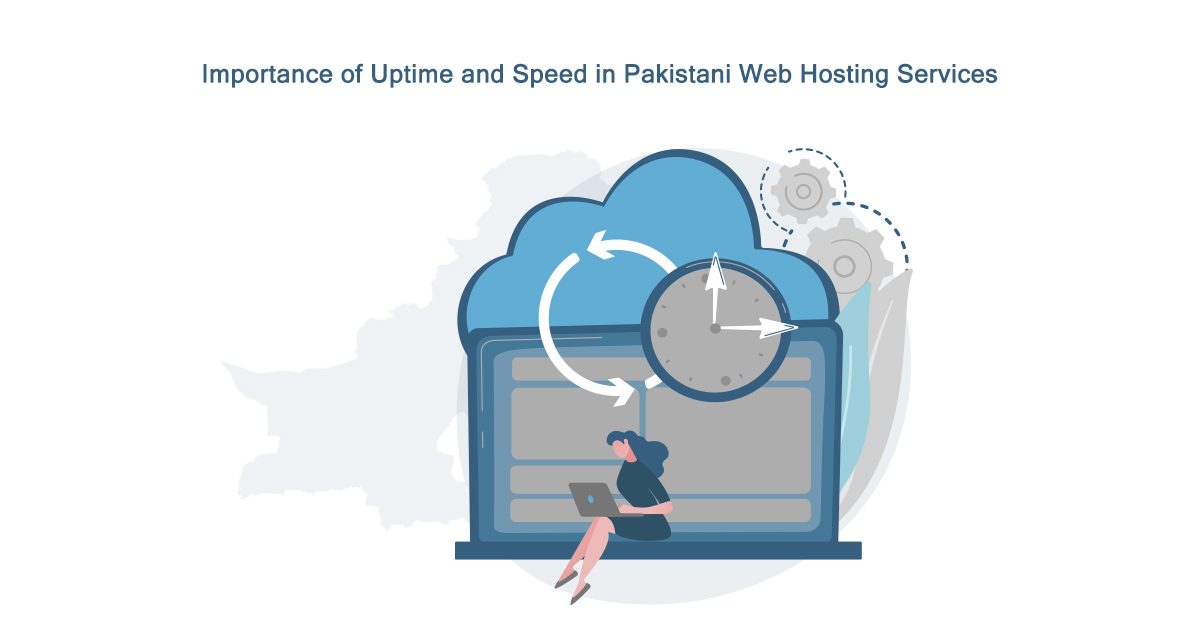Web hosting is an online service that allows you to publish your website files onto the internet. So, anyone who has access to the internet has access to your website. Web hosting in Pakistan is a service designed to optimize website performance for Pakistani audiences. It usually offers reliable connectivity, faster speeds and enhanced resources for websites targeting local visitors. Ideal for businesses and individuals in Pakistan, it ensures efficient online presence and accessibility, supporting local businesses in delivering products and services effectively while providing a strong platform for individuals to establish their online footprint within every city of Pakistan.
How to Choose Best Pakistan Hosting Provider
Selecting a web hosting plan in Pakistan requires careful consideration to ensure optimal site performance and security. Here is the list of some essential factors to keep in mind:
| Reliable Uptime | Firstly, ensure the hosting provider that guarantees at least 99.9% uptime to keep your site accessible around the clock. |
| Local Server Presence | Choose for servers located in Pakistan to enhance load times for local users, boosting both user experience and SEO rankings. |
| Flexible Scalability | Choose a hosting plan that allows for easy resource upgrades to accommodate your website’s growth without any hassle. |
| Strong Customer Support | Prioritize providers that offer 24/7 customer support via phone, email and live chat to resolve any issues swiftly. |
| Comprehensive Security | Look for advanced security features such as SSL certificates, regular data backups and malware protection to safeguard your site. |
| Cost-Effectiveness | Balance the price with the quality of services offered, focusing on obtaining the best value rather than the cheapest option. |
What Are the Key Steps for Successfully Migrating Your Website to a Pakistani Hosting Service?Check out the essential steps to migrating your website to a Pakistani hosting service.
What is Uptime and why it matters?
Uptime is the total amount of time the server hosting your website is up and running. In another words, Uptime is the percentage of time a website or server is accessible and operational. It’s a crucial metric in web hosting, as it directly impacts a website’s reliability and user experience. The higher the uptime, the more your bottom-line revenue, brand reputation and search engine visibility. As you can imagine, the stakes are high, so choose a hosting provider with a strong uptime rate, ideally 99.95%.
Impact of Downtime on Businesses and User Experience
Downtime can significantly impact both businesses and user experience, leading to financial losses, decreased productivity and a damaged reputation. Here is the list of its major effects compiled by WebsCare team:
1. Revenue Loss
- Direct Sales Loss: For e-commerce or service-based websites, every minute of downtime can mean missed sales or leads especially during peak traffic times.
- Long-term Revenue Decline: Repeated downtimes can discourage customers from returning, gradually reducing overall revenue and market share.
2. Damage to Brand Reputation
- Customer Perception: Frequent downtime can signal unreliability, making users question a business’s professionalism and credibility.
- Competitive Disadvantage: If customers can’t access your site, they will likely turn to competitors, impacting customer retention and brand loyalty.
3. SEO and Search Engine Rankings
- Negative Impact on SEO: Downtime affects crawl rates, leading to lower rankings. Google and other search engines prioritize reliable sites, so downtime can damage visibility.
- Long-term Ranking Drop: If downtime persists or happens frequently, search engines may penalize the website, affecting organic traffic over time.
4. User Frustration and Experience
- Increased Bounce Rates: Users who encounter a downed site will likely leave immediately, raising bounce rates and reducing conversion potential.
- Decreased User Loyalty: Users expect fast, uninterrupted service. Frequent downtime can create a negative user experience, leading to reduced engagement and loyalty.
5. Operational and Support Costs
- Increased Support Demands: When a site is down, businesses may experience a surge in support requests, requiring additional resources to manage customer complaints.
- Higher Operational Costs: Businesses may need to invest in additional monitoring or failover solutions to mitigate downtime risks which increases operational expenses.
Let’s read more the role of Web Hosting in Pakistan’s Growing E-Commerce Industry.
Role of Speed in Web Hosting Performance
Hosting speed is influenced by a multitude of factors including type of storage (HDD vs. SSD), server location, available resources (CPU and RAM), network infrastructure, content delivery network (CDN) integration and search engine optimization technologies such as caching mechanisms and HTTP/2 protocol. Here is the list of factors that Influence Uptime and Speed in Web Hosting Services, mentioned as:
| Server Location | Closer server locations reduce data travel time, leading to faster page loads and lower latency. |
| Type of Storage | NVMe storage offers much faster speeds than HDD and SSD, improving data transfer efficiency by directly communicating with the server’s CPU. |
| Available Resources (CPU and RAM) | More CPU cores and RAM enhance your server’s ability to handle high traffic and complex tasks. |
| Content Delivery Network (CDN) | CDNs cache website content on global servers, ensuring faster access by delivering data from the nearest server. |
| Optimization Technologies | Caching and HTTP/2 boost speed by storing data for quick retrieval and enabling faster resource loading. |
| PHP Workers | PHP workers handle multiple tasks simultaneously, essential for websites with dynamic content like e-commerce. |
| I/O Limits | Higher I/O limits allow faster data processing especially for database-heavy sites, improving performance. |
How Uptime and Speed Affect SEO and Rankings
A website with high load time will get a high bounce rate that affects directly on its search engine rankings. A drop in a website’s SEO can lead to lower conversion rates. A reliable web host improves load times with advanced caching technologies which can boost traffic significantly. Remember, faster load times mean more page views. Some of the best online tools to measure page load time are:
- Google Page Speed Tool
- Google Page Experience Checker by Cloudways
- GT Metrix
- Pingdom
Tools and Best Practices for Uptime and Speed in Web Hosting
You can improve your website’s uptime with the best practices mentioned below in list, they are easy to follow and they will guarantee results:

Perfect Web Hosting Platform
Most important aspect of your website is the web hosting plan you choose , some of the webshosting plans are like Webscare , Hostinger. If your site frequently goes down, it may be time to review your hosting plan and see if it has the resources your website needs. You might need to upgrade or switch plans. Starting with a shared hosting package is fine but as your traffic increases and your website slows down, consider moving to a VPS or dedicated server for better performance.
Cloud Hosting
Cloud hosting or the pay-per-use hosting solution is great for small, mid-size and big businesses. If you host your website on the public cloud, you will benefit from a great user-friendly and intuitive interface that will let you scale your website up or down whenever required. Hosting on cloud platform including Mochahost and hostinge etc. It is a great way to ensure that your website or application is getting the required amount of resources and you save money by paying for the actual consumption of the resources.
Reduce The Size of Images
It is important to optimize the front-end of your website for ensuring a better performance and a great user experience. Everyone likes to add images to the website, but they take up a lot of space and resources making your website slow. You can speed up your website and decrease the instances of downtimes by optimizing the images on your website. The HTTP Archive states that about 61% of a website’s page weight is made up of images. Make sure that you are using the appropriate size of images and you can also adopt new image formats like WebP or JPegXR for reducing the image weight without compromising on image quality.
Improve DNS
The DNS or the Domain Name Server is an important attribute and you might not consider it while ensuring your website’s uptime; however, it matters. DNS propagation is the first step in the process when the visitor accesses your website. If the DNS service is down, it means your website is also down. You can upgrade your DNS services and enable it with automatic failover to the other servers in the network and therefore even if the closest server goes down, your website won’t be affected.
Use A CDN (Content Delivery Network)
A content delivery network works great when it comes to tracking the static files of your website like images, CSS and Java scripts. A CDN then delivers these files through the web servers closer to the user’s location. Shorter proximity ensures faster website loading time and better website performance.
Compress The Java Scripts
Compressing the Java script files will remove the extra spaces, reduce the file size and ultimately, it will improve the loading time of your website. Another trick is to load the third party Java scripts asynchronously. Today, every website comprises of third party content like social media, live chat, commenting, information feeds etc. Therefore, if the Java scripts are loaded asynchronously, then in the event of any third-party crashes, your website page won’t be held up.
Beef Up Website Security
Data breaches and hacking attempts have increased and it is extremely crucial to safeguard your website against them. Talk to your best website hosting company about security benefits offered. If you are using a content management system, you can take a precautionary step for safeguarding your website by updating your CMS regularly. Also, make sure to use strong passwords and keep changing them frequently. You must also check our website file permissions if they are rightly defined, otherwise they might give easy access to the hackers. The web hosting plan and the web hosting company you choose also play an important role in protecting your website against the DDoS attacks.
Enable Website Caching
Website caching is a great technology that makes the website faster and leads to supreme website uptime and great user satisfaction. Websites are accessed several times in a month. Usually, every time a browser requests a web page; the server has to perform some complex and time-consuming calculations. These calculations are about retrieving your latest updates, generating headers and footers, finding your website’s sidebar widgets etc. and at most of the times, the result of all these calculations is the same. Through website caching, you can make the server remember the final result and therefore there is no need to perform any complex calculations and the web page can be served quickly. If you update your website regularly or add new posts, you don’t have to worry about serving the latest content to your viewers as you can define specific conditions in your caching system where it empties the cached files and regenerates the new ones according to your specifications. Website caching makes your website faster and eliminates the possibilities of downtime.
Conclusion
Web hosting is crucial for establishing a strong online presence in Pakistan’s growing e-commerce landscape. It significantly influences key factors like uptime and speed, which directly impact user experience, brand reputation, and search engine visibility. By selecting a reliable hosting provider and implementing best practices such as optimizing images, utilizing a content delivery network, and ensuring robust security website owners can enhance performance and mitigate risks associated with downtime. The repercussions of slow loading times and outages can lead to lost revenue, decreased customer trust, and lower search rankings. Therefore, investing in quality web hosting services is essential for achieving sustained growth, improving user satisfaction, and maintaining a competitive edge in the digital marketplace.


